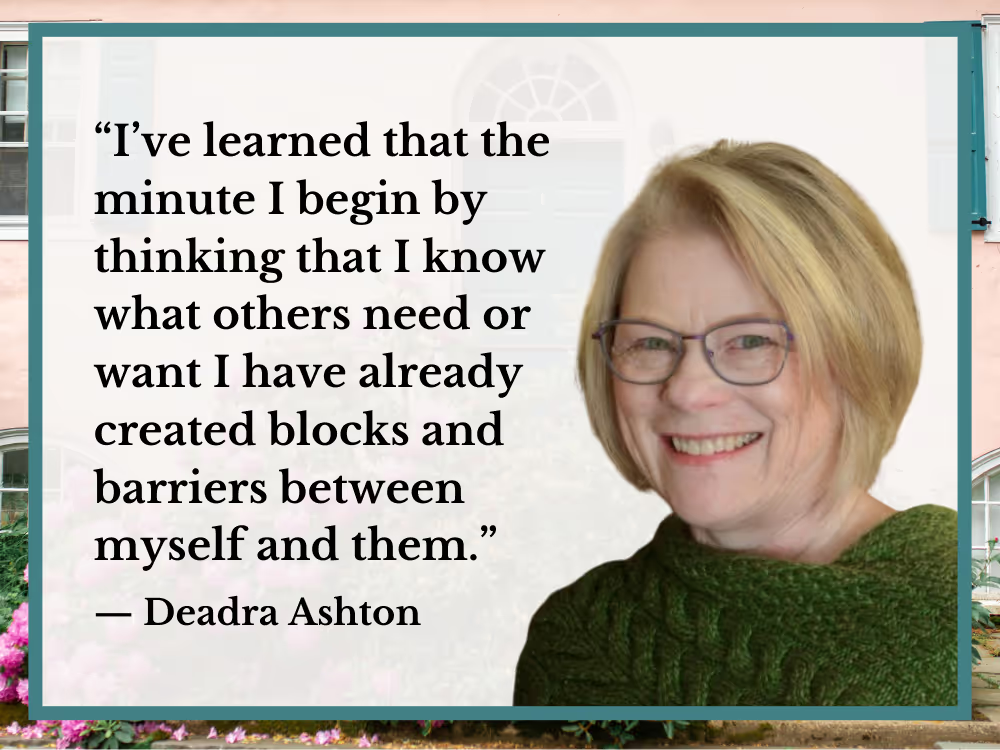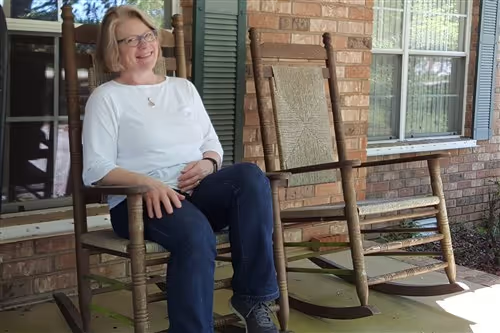March 5, 2024

Heart-to-Heart Conversations with the People of Rolling Ridge
By Rev. Michael Reed
.
Today marks the next installment of our “Seeking the Soul” series. On the first Tuesday of each month, we’re sharing a question-and-answer style interview between Rev. Michael Reed, our Associate Director, with one of our program leaders. The goal is to offer a glimpse into the heart and soul of Rolling Ridge, through the lives of the people who make up our vibrant spiritual community!
Today’s interview is with Rev. Deadra Ashton. Deadra is a spiritual director, chaplain, pastor, and writer. This fall, she takes over as Director of Gateways to God, our flagship program here at the Ridge. We count ourselves blessed to add her personal warmth and wealth of experience to our work at the Ridge. We hope you’ll enjoy the following conversation with Deadra!

Rev. Deadra Ashton
Photo credit: www.deadraashton.com
Can you tell us about your role at Rolling Ridge, and how you are involved with us?
I was serving my local community church in Tunbridge, Vermont. One day, in 2011, a brochure came across my desk for ‘Gateways to God.’ I had never heard of Rolling Ridge before, but I had been interested in doing some training and spiritual direction for some time, and this program looked like it would work for me. I could make the retreats, and from what I could see from the brochure, I loved the focus. So that’s how I got started.
Some years later, I now serve as a small group supervisor in the Gateway, which will be completed in May of this year. I am also the director of the Gateways to God cohort scheduled to begin in November of this year. We are currently receiving applications for that program.
What kind of person were you in high school? How have you changed—or not changed—since then?
I had a genuine sense of hope and optimism. I was sure that the world was going to continue to be a better and better place. These days I still live in that hope, but my optimism is tempered. Turns out, the world is way more complicated than I realized!
You’ve had quite the career—serving at various times as a pastor, a chaplain, a retreat leader, a spiritual director, and a staff member of a seminary. What do you see as the common threads or through-lines in all these roles—perhaps in terms of your sense of calling and vocation?
These days when asked what I do, I say that I provide spiritual care. That seems like the descriptor that encompasses all of those roles and titles. And the common thread or through-line is listening. It's approaching people and organizations with openness and curiosity. It’s entering every situation with a sense that there’s something I need to discover. I’ve learned that the minute I begin by thinking that I know what others need or want I have already created blocks and barriers between myself and them.
.avif)
What's your favorite unimportant thing about yourself?
About a decade ago, I had a radio show. It was called “Resonance.” And it was a local startup internet radio station, both online and broadcast in one little town. It was all run by volunteers—and it’s still running today. Anyway, “Resonance” was an eclectic mix of music based on a topic like ‘peace’ or something like that. I would take music on that theme—whether it was classical or pop or folk or jazz—and I’d mix it all in and add a kind of running commentary. It was really fun! But it was so much work that eventually, I had to give it up.
Who is a spiritual hero for you, and why?
Mary Magdalene. What a powerful woman! She fearlessly told the story of her experience at the empty tomb, no matter what the others thought of her. And I think there have been attempts throughout the centuries to taint her reputation or stifle her voice. But she still comes through.
Tell us a bit about Gateways to God. What is the program, and who is it for?
Gateways to God is a program that trains participants in the basics of spiritual direction. It’s for anyone who feels called to deepen their skills in companioning others (individuals or groups) in discerning the presence and movement of God in their lives. As with any good spiritual direction program, the focus is on listening and becoming aware of the presence of God.
What makes this program unique, I think, is that it includes training in becoming a one-on-one spiritual director and also training in discerning and identifying the soul of groups and organizations, creating a spiritual direction practice for them. The program includes six on-site retreats at Rolling Ridge, over nearly two years. The retreats are composed of large and small group learning sessions, worship, reflection, and even a day of silence. The curriculum emphasizes honing the skills of active and reflective listening (as opposed to fixing or suggesting solutions to problems), identifying practices and tools for discernment, written and verbal reflections, and creating and sustaining a personal spiritual practice. Participants are expected to be meeting with their own spiritual directors.
You might be surprised to learn that we use a lot of visual elements at Gateways, as well as physical or ‘embodied’ practices. In our worship, for example, we're intentional about creating a space where you really enter into a particular scene or milieu. The entire program begins with the image of a river. And that river stays with us throughout the first retreat. It’s a visual that flows into the worship space. We have people bring a rock to the very first retreat, and place it in the river made out of fabric. It’s a concrete way that people can begin to tell the story of their own lives, and (in time) use the river as part of their practice with their own directees.
.avif)
Registration is now open for the 2024-2026 cohort of our Gateways to God program. To learn more, click here.
How would you like to see the Gateways program grow or evolve?
The foundation of Gateways to God is learning to listen. You’re listening for the movement of God’s Spirit. Certainly, that starts with one-on-one conversations with individuals, which is what we think of as traditional spiritual direction. But in the second half of the program, Gateways brings in another, lesser-known component. It’s the component of group spiritual direction. You’re not just listening for the spirit within individuals, but also the spirit of the group as a whole. I sense a need for compassionate listeners in our culture, so I would like us to linger a bit longer on this part of our curriculum.
As an example, I thought I knew my church. But when I started asking these kinds of questions, the ones we teach in Gateways, I discovered there was this whole vein running through the church that I hadn't seen before. I thought my church was, you know, a traditionalist church. But underneath all of that, there was this amazing hospitality and care for the community. And that completely changed my focus as a pastor there. I was able to help them engage the community a little differently. It also changed the way I thought about my ministry. I began to look at the church itself as having a spirit, and my role as a kind of spiritual director with the church as a whole.
It doesn’t have to be a church. I’ve heard somebody else who was volunteering at a library, and took this exercise to her library ended up responding to the library patrons differently. Somebody else talked about using these skills as she was riding the bus!
Can you tell us about an “aha” moment you witnessed or were part of through your work at Rolling Ridge? When did you see some “get it,” and what happened as a result?
There’s a tool we use at Gateways called Silf Circles, named after author Margaret Silf. It’s a way of mapping what’s going on with a person, especially in circumstances in which the person might have choices to make. They might have pressure from the outside, and this inner tug from God.
I’ve seen lots of “ah-ha” moments in the groups I supervise as we do that particular mapping exercise. Gateways participants begin to identify times when they, as directors, have leaped to conclusions about others. They learn to pause and listen, asking clarifying questions rather than offering solutions or advice. They also learn to pay attention to what’s going on inside of themselves as they are listening to another person’s story. They begin to recognize how they might be tempted to project their own story or experience on the other person, and learn to curb that inclination. Oftentimes that exercise just clicks, and participants gain real breakthroughs on how to listen well.
If you had to hand someone a book off your shelf, and you knew that they were interested in going deeper with faith and Christian spirituality, what book would you lend them?
I’ve just finished Richard Rohr’s “The Wisdom Pattern: Order, Disorder, Reorder.” I need to go back and read that book again and again. It was so profound. I felt like if I had wanted to underline quotes, I would have to underline the whole book!
%2B(1).avif)
I imagine that in your work as a spiritual director, you often encounter dark or painful places in people’s lives. What have you learned about encountering the difficult areas of life?
You know, everybody has a crisis in life sooner or later. A crisis in life puts me in a position that’s vulnerable. It shows me that I can’t go it alone. I might have thought that I could handle every situation. But that's not true anymore. Or that I could fix everything. So not true. Or that I could just push a reset button, and everything would go back to the way it was. Not happening.
Those places of vulnerability can increase our empathy. And empathy teaches us to listen. Empathy is a stepping stone toward compassion. When I empathize, I feel what another person is feeling. When I move from empathy to compassion, I don’t get caught in those feelings, or run away from them either. This is so hard! It’s the ability to recognize that another person is in crisis; that they’re in a difficult position I am not able to fix. If I try to fix it, I’ll make it worse! It’s learning to walk alongside the other person, to say ‘I’m here with you,’ so that together you can open up the time and space for healing.
What gives you hope for the future?
Knowing that others have faced challenging times in the past and come through it gives me some comfort. Comfort becomes hope when I’m with a group of people working together to find creative and just solutions to the problems that we’re facing. And, there’s a line in the Friday morning daily prayer book that I use that gives me hope, or at least courage to face this day: “By the power of your Holy Spirit, set us free from all that we fear and let us live according to our faith.”
------------------------------------
The above conversation has been edited for length and clarity.
You can find more of Deadra Ashton’s writing at www.deadraashton.com. Interested in learning more about Gateways to God 2024? Click here or email Deadra.Ashton@rollingridge.org.
ROLLING RIDGE RETREAT AND CONFERENCE CENTER
660 Great Pond Road, North Andover, MA 01845
978-682-8815 thestaff@rollingridge.org
www.rollingridge.org
